Exam anxiety is a common experience among students, characterized by intense feelings of fear, worry, and apprehension before or during exams. In the following sections, we will explore practical techniques and approaches that students can implement to manage and alleviate exam anxiety. These strategies aim to empower students to navigate exam periods with confidence and achieve academic success.
Understanding Exam Anxiety
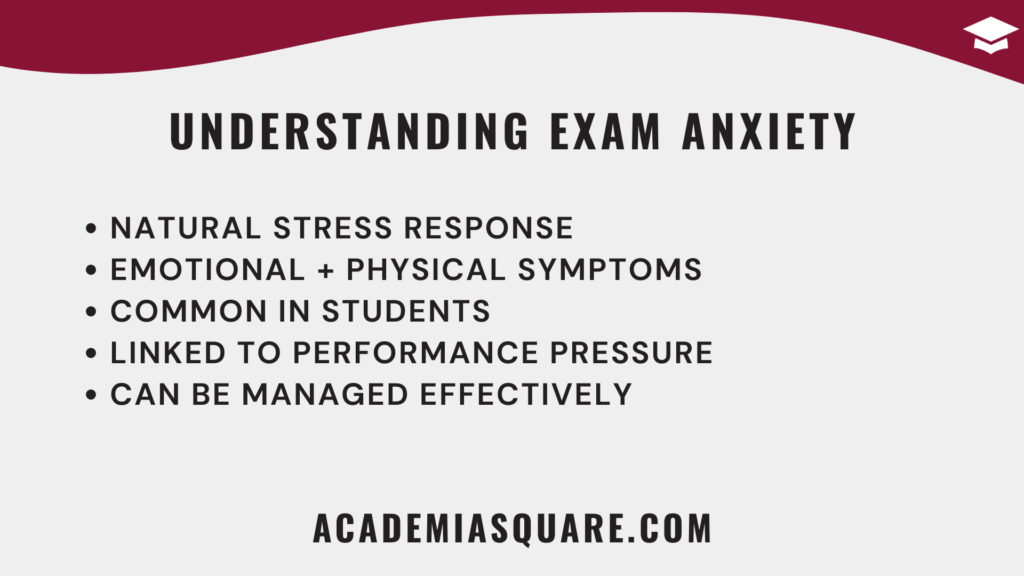
Exam anxiety is a natural response to the perceived threat posed by exams, which are often significant determinants of academic success. This anxiety can manifest through various symptoms such as increased heart rate, sweating, trembling, and difficulty concentrating.
Many students experience varying levels of exam anxiety, from mild nervousness to severe panic attacks. The intensity of exam anxiety can depend on individual factors and the specific demands of the exam. Understanding the psychological and physiological aspects of exam anxiety is crucial for developing effective coping mechanisms.
Several factors contribute to the development of exam anxiety:
- Pressure to perform well: The expectation to achieve high grades or meet academic standards set by oneself, family, or educational institutions can create significant pressure and anxiety.
- Fear of failure: The fear of not performing up to expectations or facing negative consequences such as disappointing oneself or others can intensify anxiety levels.
- Perfectionism: Students who strive for perfection may set unrealistic expectations for themselves, leading to heightened anxiety about making mistakes or not meeting their own high standards.
- Poor past exam experiences: Previous negative experiences such as failing exams or struggling with time management during tests can create a fear of repeating those experiences, contributing to anticipatory anxiety.
These triggers can interact and exacerbate exam anxiety, making it challenging for students to remain calm, focused, and perform to the best of their abilities during exams.
Furthermore, exam anxiety is not solely limited to its immediate effects during exam periods. It can also impact students’ overall well-being, self-esteem, and academic performance over time if not effectively managed.
By understanding the root causes and manifestations of exam anxiety, students can begin to recognize their own triggers and develop personalized strategies to alleviate anxiety and enhance their exam performance.
In the following sections of this guide, I will explore practical techniques and approaches that students can implement to manage exam anxiety effectively. These strategies include mindfulness exercises, cognitive-behavioral techniques, time management skills, and healthy lifestyle choices, all aimed at empowering students to overcome exam anxiety and achieve academic success.
Causes of Exam Anxiety
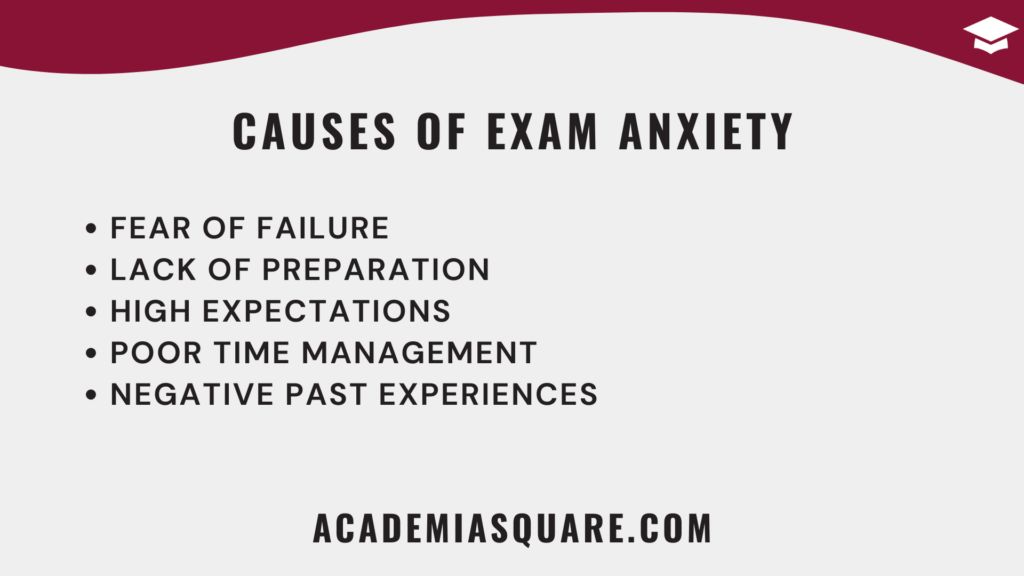
Exam anxiety is influenced by a variety of psychological and physiological factors that can significantly impact students’ performance and well-being during exams. By understanding these causes, students can develop effective strategies to mitigate anxiety and improve their academic outcomes.
- Psychological Triggers: Exam anxiety often stems from psychological factors such as negative self-talk, lack of confidence, and catastrophic thinking about the consequences of poor performance. Students may experience self-doubt and fear of failure, leading to heightened anxiety levels before and during exams. The pressure to excel academically can amplify these feelings, making it challenging to concentrate and recall information effectively.
- Physiological Responses: Anxiety triggers various physiological responses that can impair exam performance. These responses include increased heart rate, sweating, trembling, and shallow breathing. These physical symptoms not only cause discomfort but also disrupt cognitive processes essential for effective exam-taking. The body’s stress response can make it difficult for students to think clearly and perform at their best under pressure.
- Examples of Situations: Certain exam situations can exacerbate exam anxiety. High-stakes exams such as final assessments, standardized tests, or entrance exams often carry significant academic consequences. The fear of the unknown outcome and the pressure to perform well in these situations can intensify anxiety levels, affecting students’ ability to demonstrate their knowledge and skills.
Moreover, past negative exam experiences, such as failing exams or struggling with time management during tests, can create a cycle of anxiety. These experiences may lead students to anticipate similar outcomes in future exams, further heightening their anxiety levels.
Understanding these causes of exam anxiety is crucial for developing personalized coping strategies. In the following sections, we will explore practical techniques and approaches that students can implement to manage and alleviate exam anxiety. By addressing both the psychological triggers and physiological responses associated with exam anxiety, students can enhance their resilience, improve their exam preparation, and perform more effectively under stressful conditions.
Effects of Exam Anxiety
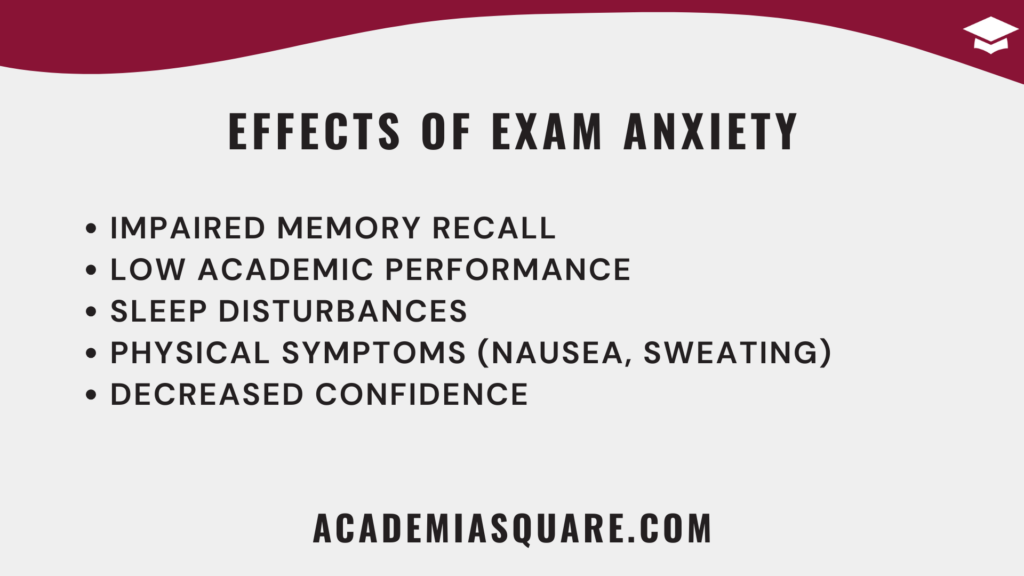
The effects of exam anxiety can significantly impact students’ academic performance and overall well-being:
- Impact on Concentration: Exam anxiety can disrupt students’ ability to concentrate effectively during exams. The overwhelming feelings of fear and apprehension can make it challenging to focus on exam questions and formulate coherent answers. Students may experience racing thoughts or mental blocks, hindering their ability to demonstrate their knowledge and understanding of the material.
- Memory Recall: Anxiety has a profound effect on memory recall. Students may struggle to retrieve information that they have studied extensively due to heightened stress levels. The stress response triggered by exam anxiety can interfere with the brain’s ability to encode and retrieve memories efficiently, leading to difficulties in recalling key concepts and details during exams.
- Cognitive Performance: High levels of anxiety can impair cognitive functions essential for academic success, such as critical thinking and problem-solving skills. Students may find it difficult to process information logically and make informed decisions under pressure. This can impact their ability to analyze exam questions effectively and provide well-structured responses.
- Emotional Impact: Beyond its cognitive effects, exam anxiety can also have a significant emotional impact on students. Persistent anxiety over exams can lead to feelings of overwhelm, frustration, and self-doubt. These emotional responses can further exacerbate anxiety levels and create a cycle of negative thinking that interferes with academic performance and overall well-being.
- Physical Symptoms: Exam anxiety often manifests through physical symptoms such as increased heart rate, sweating, trembling, nausea, and muscle tension. These physiological responses are part of the body’s natural stress response mechanism but can be disruptive during exams. Physical discomfort can distract students from focusing on exam tasks and contribute to heightened feelings of anxiety and unease.
Understanding the multifaceted effects of exam anxiety underscores the importance of developing personalized strategies to mitigate its impact. In the following sections, we will explore practical techniques and approaches that students can employ to overcome exam anxiety and achieve academic success with confidence.
Strategies to Overcome Exam Anxiety
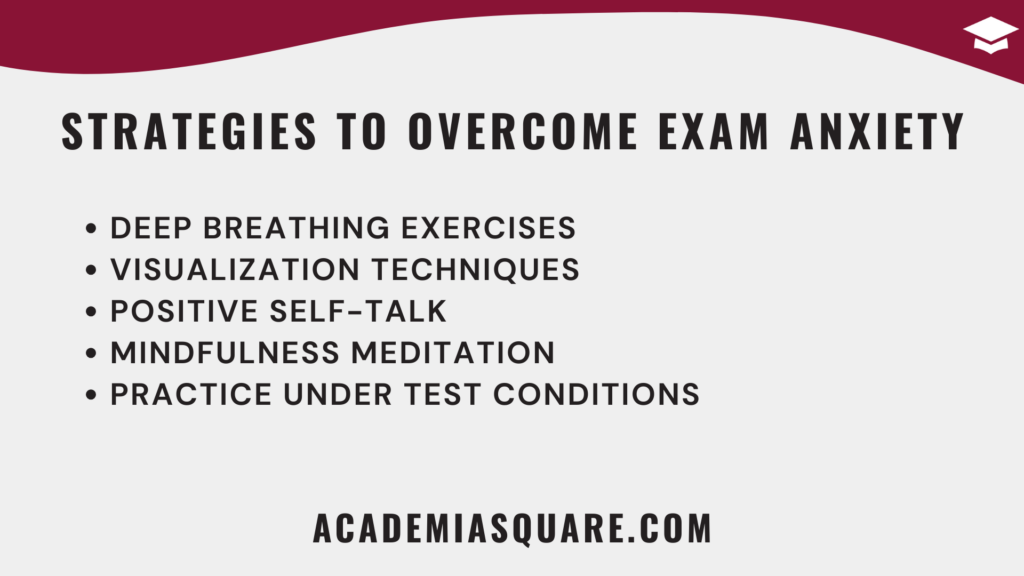
Managing exam anxiety requires proactive strategies to calm nerves and prepare effectively:
- Prepare Mentally: One of the most effective ways to combat exam anxiety is through mental preparation. Visualize success by imagining yourself confidently navigating through the exam. Practice positive affirmations to boost your confidence and alleviate negative self-talk that contributes to anxiety.
- Practical Tips: Implement practical techniques to reduce exam anxiety during your preparation and on exam day. Deep breathing exercises are proven to promote relaxation and reduce stress. Practice deep diaphragmatic breathing by inhaling deeply through your nose, holding your breath for a few seconds, and then exhaling slowly through your mouth. This technique can help regulate your heart rate and calm your nerves.
- Progressive Muscle Relaxation (PMR): PMR involves systematically tensing and relaxing different muscle groups in your body. Start with your toes and work your way up to your head, tensing each muscle group for a few seconds before releasing the tension. This technique helps reduce physical tension and promotes overall relaxation, making it easier to manage exam anxiety.
- Mindfulness Practices: Incorporate mindfulness techniques to cultivate awareness and reduce stress. Mindful breathing involves focusing on your breath, noticing each inhale and exhale without judgment. Body scan meditation involves mentally scanning your body for tension and releasing it with each exhale. These practices can help ground you in the present moment and alleviate exam anxiety by calming your mind and body.
- Visual Imagery: Use imagery techniques to mentally rehearse success. Visualize yourself entering the exam room calmly, reading through questions with clarity, and confidently providing thoughtful answers. Visualization can help reduce anxiety by familiarizing your mind with the exam environment and promoting a positive mindset.
- Time Management Strategies: Effective time management can alleviate exam anxiety by reducing last-minute cramming and promoting a structured study schedule. Break down your study sessions into manageable chunks, focusing on one topic at a time. Use techniques such as the Pomodoro Technique, where you study for 25 minutes and then take a 5-minute break, to maintain focus and avoid burnout.
- Healthy Lifestyle Choices: Prioritize self-care during exam preparation to support your mental and physical well-being. Eat balanced meals rich in nutrients to fuel your brain and body. Get regular exercise to reduce stress and improve mood. Ensure adequate sleep to promote cognitive function and emotional resilience. By taking care of your overall health, you can better manage exam anxiety and perform optimally during exams.
- Seek Support: Don’t hesitate to reach out for support from friends, family, or academic resources if you’re feeling overwhelmed by exam anxiety. Talking about your concerns can provide emotional relief and offer valuable insights or advice. Academic support services, such as tutoring or counseling, can also provide strategies and resources to help you manage stress and improve exam performance.
By incorporating these diverse strategies into your exam preparation routine and daily habits, you can effectively reduce exam anxiety and approach exams with greater confidence and resilience. Experiment with different techniques to find what works best for you, and remember that managing exam anxiety is a gradual process that improves with practice and persistence.
Next, we will delve deeper into specific study techniques and time management strategies that complement these anxiety-reducing methods, empowering you to excel academically even during challenging exam periods.
Effective Time Management Techniques
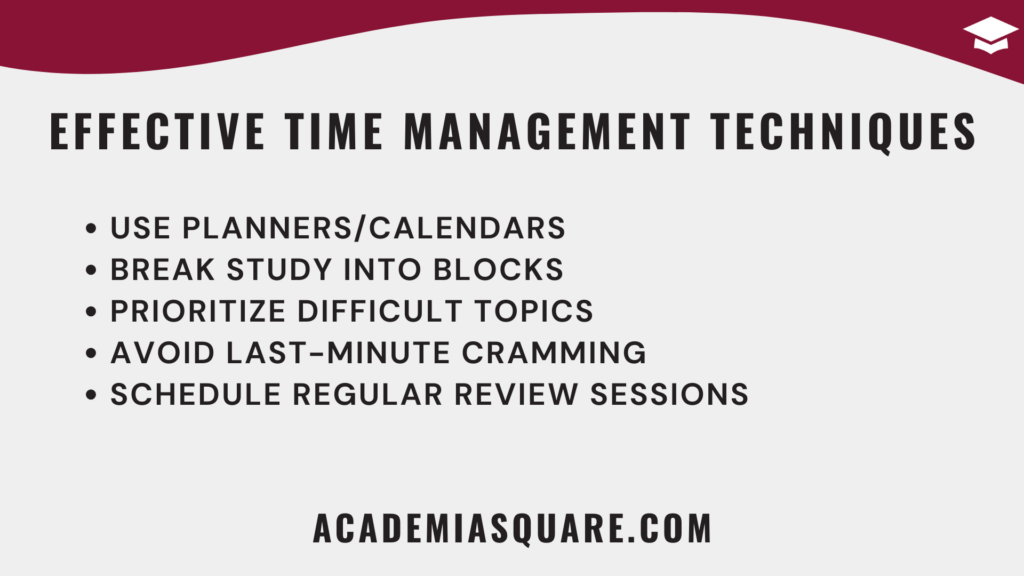
Proper time management is crucial in minimizing exam anxiety and maximizing study efficiency. Research in cognitive psychology consistently shows that structured study routines improve retention, lower stress levels, and boost confidence. Below are science-backed strategies that can help you organize your time more effectively and approach exams with a clear, confident mindset:
Study Schedules
Creating a study schedule eliminates the guesswork from exam preparation. Rather than wondering what to study each day, a schedule allows you to systematically review material over time, improving long-term memory. Start by breaking down your syllabus and allocating realistic time slots for each topic. Use digital planners, spreadsheets, or mobile apps to structure your study blocks.
To get the most out of your study schedule, integrate research-backed learning strategies such as:
- Active Recall – Test yourself regularly instead of rereading material to strengthen memory retrieval pathways.
- SQ3R Method – Follow five steps: Survey, Question, Read, Recite, and Review to deepen comprehension and retention.
- Spaced Repetition – Space out study sessions over time to take advantage of the “spacing effect,” which helps convert short-term memory into long-term memory.
- Mind Mapping – Use visual diagrams to connect ideas, organize content, and enhance conceptual understanding — especially useful for visual learners.
Advantages of Setting Goals
Setting specific and attainable goals transforms a vague sense of urgency into a focused path forward. According to goal-setting theory, specific goals increase performance by directing attention and fostering persistence. Use the SMART framework (Specific, Measurable, Achievable, Relevant, Time-bound) to shape your objectives. For example, “Complete two past papers this week” is far more actionable than “Study more.” Regularly achieving these goals can boost dopamine levels, creating positive reinforcement loops that lower exam anxiety and build momentum.
Examples of Time Management
Applying structured time-management strategies can make your study sessions more efficient and less mentally exhausting. These methods are backed by research in productivity and cognitive science, helping you protect focus, reduce decision fatigue, and combat procrastination. Effective techniques include:
- Pomodoro Technique – Study in focused 25-minute intervals with short breaks to maintain concentration and avoid burnout.
- Time-Blocking – Schedule specific tasks into blocks on your calendar to ensure structured, distraction-free sessions.
- Memory Aids & Mnemonics – Combine time-blocked sessions with techniques like chunking, visualization, or storytelling to retain complex material more efficiently.
Integrating these approaches into your daily routine allows you to work smarter, not longer. You’ll feel more in control of your progress and better equipped to handle exam challenges with reduced stress and greater clarity.
Improving Study Habits
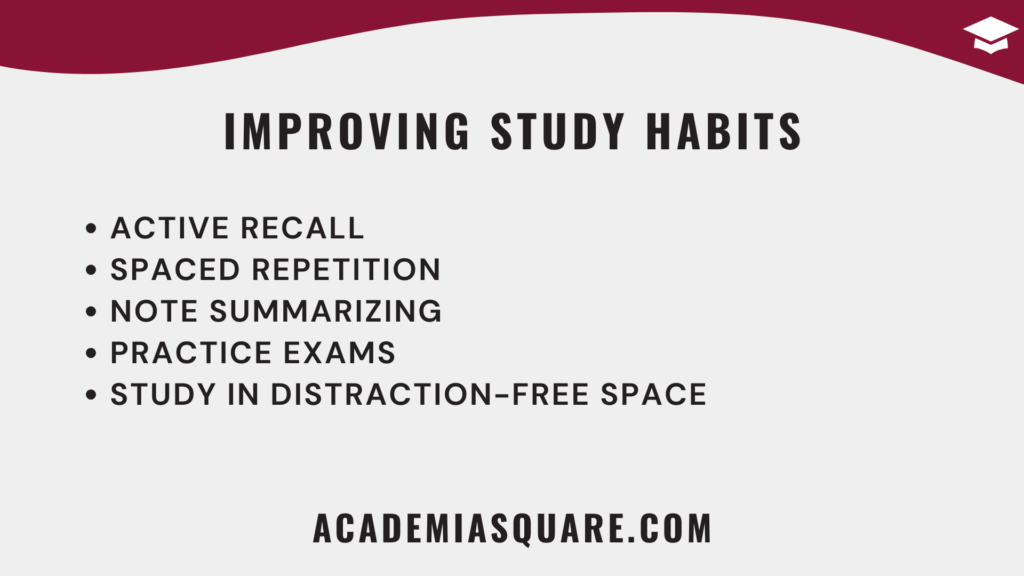
Developing effective study habits is essential not only for better academic results but also for reducing exam anxiety. Consistent and intentional learning routines train your brain to retain more information while reducing last-minute panic. Below are science-backed strategies and practical examples that can help transform your study approach into a powerful tool for success.
Effective Study Techniques
Using the right techniques can make a dramatic difference in how much you learn and how well you remember it. Passive reading and highlighting might feel productive but often yield poor results when tested under pressure. Instead, try evidence-based techniques that optimize how the brain encodes and retrieves information. These include:
- Active Recall – Practicing retrieval through self-quizzing helps solidify memory and improves exam performance significantly.
- Spaced Repetition – Repeated exposure to material at increasing intervals enhances long-term retention by leveraging the brain’s natural forgetting curve.
- SQ3R Method – This structured reading strategy improves comprehension and makes studying more efficient through five steps: Survey, Question, Read, Recite, and Review.
Incorporating these techniques into your daily study routine will help you feel more prepared and less overwhelmed as exams approach.
Examples of Study Strategies
Organizing and reviewing information in a meaningful way is key to mastering complex material. Effective study habits often begin with how you process and capture information during lectures or reading sessions. Consider applying structured methods such as:
- Cornell Note-Taking – A proven layout that encourages active summarizing, questioning, and review.
- Mind Mapping – A visual approach to linking concepts that’s especially useful for subjects with interconnected ideas.
- Summarization and Teaching – Explaining what you’ve learned to someone else (or out loud to yourself) engages higher-order thinking and reinforces memory.
These strategies don’t just help you remember more — they also give you a sense of control and progress, which directly reduces exam anxiety.
Advantages of Study Breaks
Studying effectively doesn’t mean studying constantly. In fact, neuroscience shows that the brain consolidates information more efficiently when rest is incorporated into the learning process. Regular breaks reduce mental fatigue, improve concentration, and support emotional regulation. To maximize the benefits:
- Follow the 50/10 Rule – Study for 50 minutes, then take a 10-minute break to walk, stretch, or breathe deeply.
- Move Your Body – Engaging in light physical activity during breaks can boost mood and cognitive function by increasing blood flow to the brain.
- Avoid Screen Fatigue – Use breaks to step away from digital devices; try hydration, nature, or mindfulness exercises instead.
Integrating well-timed breaks into your routine not only improves learning but also reduces the physical and psychological toll of extended study sessions.
By adopting these intentional study habits — from applying brain-based learning techniques to allowing your mind time to recharge — you’ll reduce exam anxiety and position yourself for consistent academic success.
Healthy Lifestyle Choices

Leading a healthy lifestyle isn’t just about physical wellness — it plays a central role in reducing exam anxiety and enhancing mental performance. How you eat, sleep, and move directly impacts your brain’s ability to concentrate, retain information, and regulate emotions. Incorporating healthy habits into your daily routine builds resilience and creates a stronger foundation for academic success.
Diet and Nutrition
The food you consume has a direct influence on cognitive function and emotional stability. Nutrient-dense diets support optimal brain activity and reduce the physiological symptoms of stress. To support focus, energy, and memory during exam periods, aim to include the following in your meals:
- Omega-3 Fatty Acids – Found in fatty fish (like salmon), flaxseeds, and walnuts, omega-3s are linked to improved brain function and reduced symptoms of anxiety and depression.
- Antioxidants – Berries, dark chocolate, leafy greens, and green tea contain antioxidants that combat oxidative stress, which can impair cognitive function.
- Complex Carbohydrates and Protein – Whole grains, legumes, eggs, and lean meats provide sustained energy and support neurotransmitter function, crucial for stable mood and concentration.
In contrast, excessive caffeine, sugar, and processed foods may contribute to mood swings, energy crashes, and heightened anxiety — especially during high-stress times like exams.
Physical Activity
Exercise is one of the most effective natural methods for lowering stress levels and enhancing mental clarity. Regular physical activity reduces cortisol (the primary stress hormone) while increasing the production of endorphins, which improve mood and promote a sense of calm. You don’t need to engage in intense workouts to benefit — even light to moderate activities can make a difference. Consider:
- Walking or Jogging – Just 20–30 minutes of brisk walking a day can boost energy and focus.
- Yoga and Stretching – These combine movement with mindfulness, which can be particularly helpful in calming exam-related nerves.
- Strength Training or Sports – These can improve physical confidence and provide a structured outlet for emotional release.
Incorporating movement into your study routine — even short breaks with physical activity — can significantly improve both mental stamina and mood.
Advantages of Adequate Sleep
Sleep is a cornerstone of academic performance and emotional regulation. During sleep, the brain consolidates memories, processes information, and restores cognitive resources — all of which are essential for effective learning. Poor sleep quality or insufficient rest can impair attention, problem-solving, and memory, while also increasing irritability and anxiety.
- Stick to a Sleep Schedule – Going to bed and waking up at the same time each day helps regulate your internal clock, improving sleep quality.
- Create a Wind-Down Routine – Limit screen exposure before bed, and instead engage in calming activities like reading, journaling, or breathing exercises.
- Aim for 7–9 Hours – This range supports optimal memory consolidation and emotional resilience during demanding academic periods.
Remember, sleep is not lost time — it’s a critical investment in your mental and physical health, especially when preparing for exams.
By making intentional choices about your diet, physical activity, and sleep, you build a lifestyle that naturally supports your brain’s best performance. These habits not only help reduce exam anxiety but also set the stage for sustainable academic success and well-being.
Seeking Support for Exam Anxiety
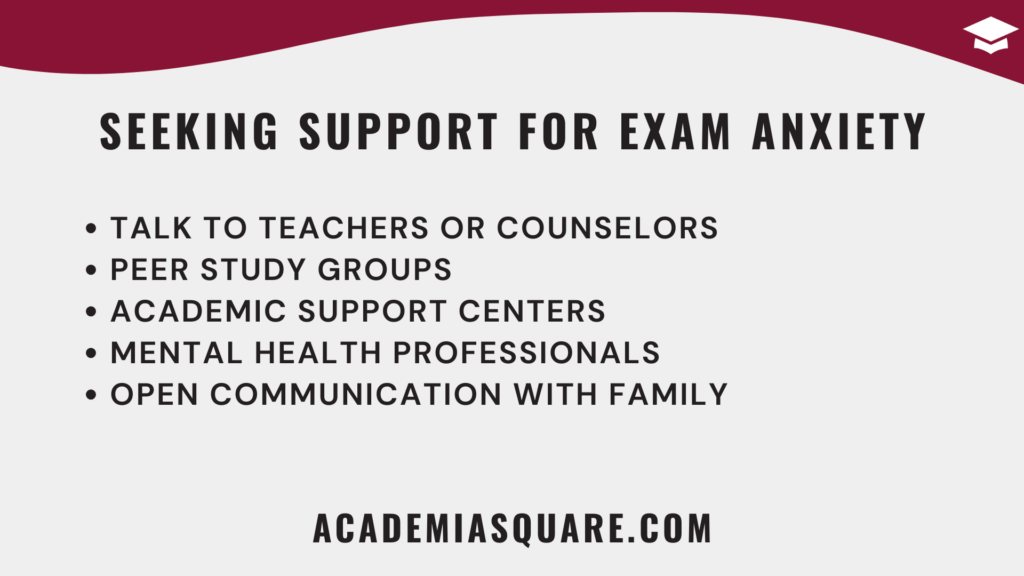
Exam anxiety can feel overwhelming, but you don’t have to face it alone. Reaching out for support is not a sign of weakness — it’s a proactive step toward managing stress and improving performance. Many students find relief and practical solutions by engaging with people and resources in their academic and social environment. Below are effective ways to seek support and reduce the burden of exam pressure.
Communicate with Professors
If you’re struggling with exam-related stress, don’t hesitate to speak with your professors or academic tutors. They are often more understanding than students expect and can provide clarity, reassurance, or even reasonable accommodations. Open communication allows educators to recommend strategies, extend deadlines (when appropriate), or connect you with academic support services. Approaching them early, rather than waiting until anxiety peaks, can prevent misunderstandings and foster a sense of academic partnership.
Campus Resources
Most colleges and universities offer a variety of services specifically designed to support student mental health. Counseling centers typically provide individual therapy, stress management workshops, or mindfulness sessions that can directly address exam anxiety. Additionally, many campuses host student wellness initiatives, academic coaching, and test preparation programs. These services are confidential and free or low-cost — and can make a significant difference in both emotional well-being and academic readiness.
- Counseling Services – For managing anxiety, building coping skills, or simply having a safe space to talk.
- Academic Coaching – Help with time management, study planning, and learning strategies tailored to your needs.
- Stress-Relief Programs – Activities like guided meditation, pet therapy, or peer-led discussions during exam season.
Peer Support
Connecting with other students can ease feelings of isolation and help normalize the stress you’re experiencing. Peer support is a powerful way to share strategies, motivate each other, and reduce the emotional weight of exams. Study groups can also promote accountability and improve understanding through discussion and collaboration. Even informal conversations with friends who are going through the same pressures can be incredibly grounding.
- Form Study Groups – Collaborating with peers helps break down complex topics and promotes active engagement.
- Share Experiences – Discuss what works for managing stress — whether it’s a study hack, a relaxation app, or a change in routine.
- Encourage One Another – Simple words of support from a peer can provide a much-needed morale boost during crunch time.
Remember, you’re not alone in feeling anxious about exams — it’s a common experience shared by students around the world. What matters most is how you respond to that anxiety. By seeking support, you’re taking control of your mental health and building a stronger, more resilient foundation for your academic journey.
Exam Strategies to Manage Anxiety
Implementing effective exam strategies is essential for managing exam anxiety and performing confidently:
- Strategic Approach: Gain familiarity with exam formats and practice past papers to reduce exam anxiety and build confidence in your exam-taking abilities. Understanding the structure and expectations of exams helps alleviate uncertainty and nervousness.
- Test-Taking Techniques: Utilize proven test-taking strategies to optimize your performance under pressure. Techniques such as skimming through questions to prioritize easier ones first, effectively managing time allocations for each section, and maintaining a calm demeanor during challenging moments can significantly reduce exam anxiety.
- Advantages of Practice: Regular practice through mock exams and simulated test environments helps familiarize you with exam conditions. This preparation not only enhances your knowledge retention and recall but also desensitizes you to the stressors associated with exam anxiety. The more accustomed you are to the exam process, the more confident and composed you’ll feel on test day.
- Visual Imagery: Incorporate visualization techniques into your exam preparation routine. Visualize yourself entering the exam room calmly, reviewing questions with clarity, and confidently providing accurate responses. Visualization helps create a positive mental image of success, reducing anxiety and enhancing performance.
- Effective Time Management: Develop a structured study schedule that prioritizes consistent review and practice. Use techniques like time blocking or the Pomodoro Technique to break study sessions into manageable intervals with regular breaks. Effective time management not only optimizes your study efficiency but also reduces last-minute cramming and associated exam anxiety.
- Utilize Relaxation Techniques: Integrate relaxation practices into your daily routine to manage stress and promote mental clarity. Techniques such as deep breathing exercises, progressive muscle relaxation, and mindfulness meditation help calm the mind and alleviate physical tension associated with exam anxiety. Regular practice enhances your ability to stay focused and composed during exams.
By adopting these comprehensive exam strategies, you can approach exams with confidence, effectively manage exam anxiety, and optimize your academic performance.
Developing long-term strategies for managing exam anxiety ensures sustained academic success:
- Continuous Stress Management: Integrate stress management techniques into your daily routine to build resilience against exam anxiety. Engage in regular physical exercise, practice relaxation exercises such as yoga or tai chi, and pursue hobbies that promote relaxation and mental well-being. These activities reduce overall stress levels and enhance your ability to cope with academic pressures.
- Learn from Exam Performance: Reflect on past exam experiences to identify areas for improvement and refine your study strategies. Analyzing mistakes and challenges helps you develop effective study habits and adapt your approach to exams, minimizing future exam anxiety. Embrace each exam as an opportunity for growth and learning.
- Develop Coping Strategies: Cultivate positive coping mechanisms to manage exam anxiety in the long term. Practice positive self-talk to build confidence and challenge negative thoughts related to exams. Use visualization techniques to mentally prepare for challenging situations and visualize successful outcomes. Seek support from peers, mentors, or counseling services when needed to gain perspective and guidance.
- Seek Professional Support: If exam anxiety significantly impacts your academic performance or overall well-being, consider seeking professional support. Academic advisors, counselors, or psychologists can provide personalized strategies and resources to address exam anxiety and support your academic success.
By adopting these long-term management strategies and integrating them into your academic journey, you can effectively navigate exam anxiety, achieve consistent academic success, and maintain overall well-being.
Conclusion
In conclusion, exam anxiety is a common challenge that many students face, but it can be managed effectively with the right strategies and techniques. By understanding the causes and effects of exam anxiety, implementing practical strategies such as effective time management, improving study habits, leading a healthy lifestyle, seeking support, and adopting exam strategies, you can reduce exam anxiety and perform better in exams.
Remember, managing exam anxiety is not just about academic performance but also about maintaining your overall well-being and mental health. By prioritizing self-care and utilizing the resources available to you, you can navigate exam periods with confidence and resilience.
I hope this guide has provided you with valuable insights and actionable tips to help you overcome exam anxiety effectively. Remember, you are capable, and with the right mindset and strategies, you can conquer exam anxiety and excel academically.
For more resources and support on managing exam anxiety, feel free to explore additional articles on AcademiaSquare.
Best of luck with your exams!
FAQs – How to Deal with Exam Anxiety
What are two ways to deal effectively with anxiety during an examination session?
Two effective methods include practicing deep breathing to calm the nervous system, and using positive self-talk to challenge negative thoughts. Research from the American Psychological Association supports these as proven techniques to reduce test anxiety and improve focus.
Why do I get so anxious before exams?
Exam anxiety is often triggered by fear of failure, lack of preparation, or pressure to perform well. It activates the body’s stress response, leading to physical symptoms like a racing heart and mental blocks, according to Harvard Health Publishing.
How can I calm my nerves before an exam?
To calm your nerves, try progressive muscle relaxation, visualization techniques, and mindful breathing. According to the Mayo Clinic, these techniques help activate the parasympathetic nervous system, promoting calmness and mental clarity.
Does preparation reduce exam anxiety?
Yes, preparation is one of the best antidotes to exam anxiety. A structured study schedule, mock tests, and active recall improve confidence and reduce last-minute stress, according to a study published in the Journal of Educational Psychology.
Can diet and sleep affect exam anxiety?
Absolutely. A balanced diet rich in whole grains, lean protein, and omega-3s supports brain function, while 7–9 hours of quality sleep helps regulate mood and memory retention. Both are crucial in minimizing anxiety, as confirmed by the CDC and NIH.
Is it normal to feel anxious even after studying?
Yes, even well-prepared students can feel anxious. This is often due to perfectionism or fear of the unknown. The key is to focus on what you can control and practice acceptance-based strategies to ease performance pressure.
What breathing techniques help reduce test anxiety?
Box breathing (inhale 4 seconds, hold 4, exhale 4, hold 4) and 4-7-8 breathing are effective for reducing cortisol levels and calming the mind. These are widely used in cognitive behavioral therapy (CBT) for anxiety management.
What should I do if I blank out during the exam?
If you blank out, take a brief pause, close your eyes, and breathe deeply. Then, skip the question and return later. Often, your memory resets after a short mental break, helping you recall the information.
Can physical exercise help with exam anxiety?
Yes, regular exercise releases endorphins and reduces stress hormones like adrenaline and cortisol. The Anxiety and Depression Association of America (ADAA) reports that even 20 minutes of aerobic exercise can significantly lower anxiety levels.
How can positive self-talk improve exam performance?
Positive affirmations help reframe negative thoughts and boost confidence. For instance, repeating “I am prepared” or “I can do this” can shift your mindset from fear to control, which is essential in high-stakes testing environments.
Should I seek professional help for chronic exam anxiety?
Yes, if exam anxiety interferes with daily life or academic performance, speaking to a counselor or psychologist is advisable. CBT and exposure therapy have been shown to effectively reduce test anxiety long-term, according to the American Psychological Association.
Can mindfulness help reduce exam stress?
Yes, mindfulness techniques like meditation and body scans reduce rumination and anxiety. A meta-analysis from the Journal of Cognitive Enhancement found that mindfulness practices significantly lower stress and improve academic performance.
Is group study effective for reducing exam pressure?
Group study can alleviate stress by fostering peer support and shared understanding. However, it’s most effective when the group stays focused and sets clear goals, as highlighted in collaborative learning research from Stanford University.
What are the signs of exam anxiety?
Common signs include nausea, sweating, rapid heartbeat, irritability, trouble concentrating, and negative thoughts. Recognizing these symptoms early can help you implement strategies to manage them before they escalate.
How long before the exam should I start managing my anxiety?
Ideally, begin managing anxiety weeks in advance through consistent study, stress-reduction techniques, and healthy habits. Cramming the night before not only hinders retention but also spikes cortisol levels, making anxiety worse.
Sources and Recommended Reading on Exam Anxiety
- Putwain, D. W., et al. “Test Anxiety Does Not Predict Exam Performance When Knowledge Is Controlled.” Psychological Science, 2022.
- Yusoff, M. S. B. “Test Anxiety: State, Trait and Relationship with Exam Satisfaction.” International Medical Journal, 2012.
- Centers for Disease Control and Prevention. “Symptoms of Generalized Anxiety Disorder Among Adults.” National Center for Health Statistics, 2019.
- OpenStax. “6.3 Test Taking.” College Success, 2018.
- Miller, R. M. “Exam Anxiety: A Review Including Assessment Alternatives to Summative Exams.” Journal of Education and Practice, 2023.
- Harvard University. “Test Anxiety.” Academic Resource Center, 2023.
- Stanford University. “Tip of the Month: How to Ease Test Anxiety.” Student Affairs, 2023.
- eCampusOntario. “6.1 Test Anxiety and How to Manage It.” Student Success, 2022.
- eCampusOntario. “12.8 Taking Action for Test Anxiety.” Pre-health Science Pathways, 2023.
- Kaya, M., et al. “The Effect of Students’ Test Anxiety Prevention Program on Students’ Test Anxiety.” SAGE Open, 2024.
- Academia Square. “How to Improve Your Grades Fast.”
- Academia Square. “How to Memorize Faster: Science-Based Techniques.”


